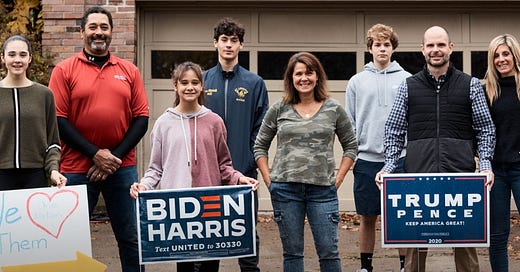Jim Moore: *Reminder* Your neighbor may have voted differently than you
We tend to want to view the political world in us vs. them. But those thems are living, working, and trying to figure out the future along with all of us us’s.
Jim Moore is a longtime observer of Oregon and West Coast politics. He is also a political analyst for various media outlets, and professor at Pacific University.
Another Take on the Elections—Your Neighbors Have Different Opinions No Matter Where You Live
Another election is about done. Nationally many states are experiencing what Oregon experienced with vote by mail in our first few election cycles: getting county election resources matched up to the inflow of ballots and the requirements of state law is sometimes more difficult than you would think. But all the votes should be counted soon, and then we will have official results.
Here in Oregon, the remaining ballots tend to be those with issues. Most of them will be resolved when voters come in and verify signatures, actually sign their ballots, or otherwise reaffirm that they really did cast the ballot in that particular envelope.
The two Oregons have reasserted themselves in the presidential results with lots of Republican red in the south and east of the state and lots of Democratic blue in the Willamette Valley and an increasing number of coastal and central Oregon counties.
But a closer look reveals a much more nuanced and interesting story. In every Republican county, hundreds and thousands of people voted for Biden and Harris for president. And in every Democratic county, thousands of people voted for Trump and Pence. Let me say that again—hundreds and thousands. These are your neighbors, co-workers, fellow church and club members. They voted for different presidents, and I would bet that most of them don’t wear campaign t-shirts, hats, or have bumper stickers on their cars.
What does this look like from the data?
First, more Oregonians cast votes for the presidential candidates than other statewide candidates.
The total presidential votes: 2.35 million (out of 2.41 million returned ballots).
The US Senate total: 2.3 million—50,000 fewer.
Secretary of State: 2.26 million—90,000 fewer.
Treasurer: 2.24 million—110,000 fewer.
Attorney General: 2.24 million—110,000 fewer.
Just for comparison, the total number of registered voters for Oregon’s thirteen smallest-population counties is about 112,000.
Second, the bulk of Trump votes were not in eastern and southern Oregon. They were in Oregon’s highest-population counties. Clackamas: 108,407; Washington: 98,661; Multnomah: 82,410; Lane: 80,144; Marion: 78,424. Forty-seven percent of Trump’s votes came from these five counties, all of which went for Biden.
Third, in the counties that were strongest for Trump, hundreds and thousands of people voted for Biden. Nine counties supported Trump with more than 70% of the vote. They averaged 75%, with Lake County almost hitting 80%. But in those nine counties, an average of 1,200 people voted for Biden (average of almost 3,900 for Trump). As a comparison, the total Trump vote of these super-Trump counties was only 42% of the number of votes Trump received in deeply Democratic Multnomah County.
That is a lot of people who regularly interact with each other but have strongly divergent views on who should be president. We are interwoven, we Oregonians who voted for president. Most of our neighborhoods, businesses, social gatherings, and public institutions are filled with people who disagree on who ought to lead the country. But we focus on making those relationships work because we have important reasons for working together.
I heard a winning State House candidate say that she had heard a strong message from her new constituents—that her main issues were their main issues. That is politics. She will go to Salem and work hard for what she thinks is right. But she is missing the full picture of her particular district. Yes, more than 21,000 voters supported her vision, but more than 18,000 did not.
We tend to want to view the political world in us vs. them. But those thems are living, working, and trying to figure out the future along with all of us us’s. The sooner “We The People” start pressing our elected officials to act in all of our best interests and stop thinking as primarily party-driven actors, the better off we will all be. And it would make sense for voters to realize that our daily lives and goals are more important to us than who sits in an oddly shaped office in an old building in Washington, D.C.
I am not holding my breath that any of this will happen soon.
*******************************
Keep the conversation going: Facebook (facebook.com/oregonway), Twitter (@the_oregon_way)
#62






